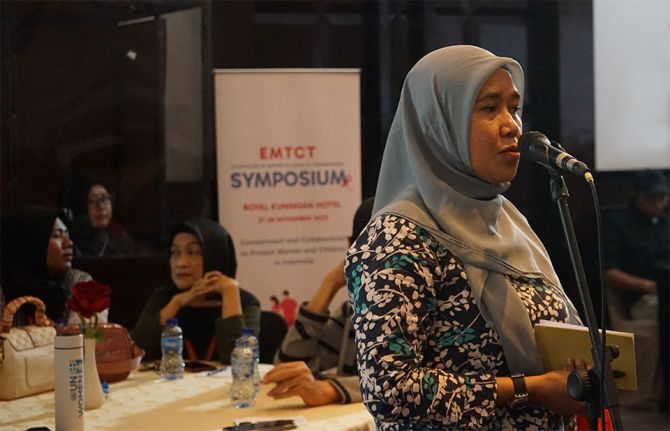
Feature Story
UNAIDS requests Pope Benedict XVI for support in efforts to stop new HIV infections in children
11 April 2012
11 April 2012 11 April 2012
UNAIDS Executive Director Michel Sidibé with the Pope Benedict XVI.
Credit: L'Osservatore Romano
The Executive Director of UNAIDS Michel Sidibé has asked for Pope Benedict XVI’s personal engagement in ending new HIV infections in children. During an audience with the Pope, Mr Sidibé spoke to him about how keeping children free from HIV was an achievable goal and, with concerted efforts, one which can be reached by 2015.
“Millions of people around the world living with and affected by HIV are being supported by catholic health care organizations,” said Mr Sidibé. “The full engagement of the Catholic Church in efforts to achieve zero new HIV infections among children is of paramount importance.”
The Vatican estimates that Catholic Church-related organizations provide approximately 25% of all HIV treatment, care, and support throughout the world. In 2010, the Vatican reported that more than 5,000 hospitals, 18,000 dispensaries, and 9,000 orphanages, many involved in AIDS-related activities, were being supported by the Catholic Church.
To reach the goal of ending new HIV infections in children by 2015, UNAIDS and partners launched a Global Plan towards the elimination of new HIV Infections among children by 2015 and keeping their mothers alive at the 2011 United Nations High Level Meeting on HIV/AIDS. The plan outlines a strategy which focuses particularly on the 22 countries that account for more than 90% of new HIV infections in children world-wide.
Following the audience Mr Sidibé met with Mr Michel Roy, Secretary General of Caritas Internationalis, a confederation of 164 Catholic relief, development and social service organizations operating in over 200 countries and territories worldwide. As a valued partner of UNAIDS, Caritas Internationalis serves as one of the civil society organizations represented on the steering committee of the Global Plan to eliminate new HIV infections in children.
The full engagement of the Catholic Church in efforts to achieve zero new HIV infections among children is of paramount importance
Michel Sidibé, Executive Director of UNAIDS
Faith-based organizations are instrumental in providing HIV related prevention, treatment care and support to people living with and affected by HIV. The World Health Organization has estimated that faith-based groups provide between 30% and 70% of all health care in Africa. During their in depth discussions about the Global Plan and on opportunities for further collaboration and strengthened partnerships in responding to HIV Michel Sidibé said, "No more babies born with HIV is an achievable goal. This is something we can get everyone to agree on as well as the importance of keeping their mothers alive.”
Mr. Michel Roy said: "The worldwide response to HIV has been a priority of Caritas Internationalis for the past 25 years. We will continue our commitment in this area. We strongly support the efforts to eliminate HIV infection among children. The Caritas ‘HAART for Children’ campaign shares a similar goal by promoting greater uptake of prevention of mother-to-child transmission programs and by assuring that children living with HIV, as well as their mothers, have access to early diagnosis and treatment."
Mr Sidibé subsequently met with Cardinal Peter Turkson, President of the Pontifical Council for Justice and Peace. In 2009, the Cardinal, originally from Ghana, served as one of the Co-Presidents of the Second Extraordinary Assembly for Africa or the Synod of Bishops. Under Cardinal Turkson’s leadership the Bishops discussed HIV, and in their final message, encouraged additional commitment from the Church to ending AIDS.
In their discussions Cardinal Turkson and Mr Sidibé talked about the AIDS epidemic in Africa, sustainable financing and HIV as a development issue.
“The response to HIV is a social justice issue,” said Mr Sidibé. “It is about a fairer allocation of resources within countries and especially their more equitable redistribution North-South.”
Speaking on the plan to eliminate new HIV infections in children Cardinal Turkson said, “With the medical technology readily available, making sure that children are born free of HIV-infection is a goal the human family can and should achieve, without delay, and would contribute to the human, economic and social development of the countries involved.”
Recognising the important work of the faith community in the AIDS response, UNAIDS established a strategic framework in 2009––to strengthen partnerships between UNAIDS and faith based organisations. The framework outlines the need for global and national religious leaders to take supportive public action in the AIDS response and strengthen the capacity of faith based organisations to work on HIV issues.
During his visit to Rome, Mr Sidibé also met with Staffan de Mistura, Under-Secretary of State of the Ministry of Foreign Affairs of Italy, with whom he discussed the importance of Italy maintaining its long tradition of leadership in the global AIDS response. Mr de Mistura expressed Italy’s strong support for UNAIDS vision of zero new HIV infection, zero discrimination and zero AIDS-related deaths, and particular interest in the global plan to end new HIV infections among children.


